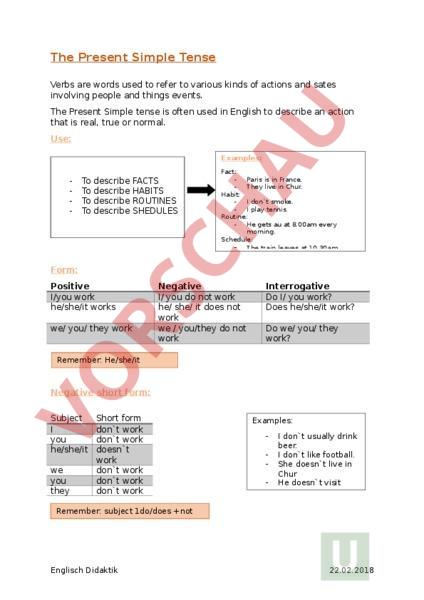Arbeitsblatt: Present simple tense
Material-Details
ÜBERSICHTSBLATT ZU PRESENT SIMPLE
Englisch
Grammatik
6. Schuljahr
2 Seiten
Statistik
182758
423
7
23.08.2018
Autor/in
Livia Hunger
Land: Schweiz
Registriert vor 2006
Textauszüge aus dem Inhalt:
The Present Simple Tense Verbs are words used to refer to various kinds of actions and sates involving people and things events. The Present Simple tense is often used in English to describe an action that is real, true or normal. Use: Examples: To To To To describe describe describe describe FACTS HABITS ROUTINES SHEDULES Fact: Paris is in France. They live in Chur. Habit: dont smoke. play tennis. Routine: He gets au at 8.00am every morning. Schedule: The train leaves at 10.30am. Form: Positive I/you work he/she/it works we/ you/ they work Negative I/ you do not work he/ she/ it does not work we you/they do not work Interrogative Do I/ you work? Does he/she/it work? Do we/ you/ they work? Remember: He/she/it infinitive s Negative short form: Subject you he/she/it we you they Short form dont work dont work doesnt work dont work dont work dont work Examples: dont usually drink beer. dont like football. She doesnt live in Chur He doesnt visit Remember: subject 1do/does not infinitive Englisch Didaktik 22.02.2018 The Past Simple Tense The Past Simple represents process or condition that has taken place in the past and has been completely completed. There is no connection to the present. Use: Examples: something that happened once in the past something that happened again and again in the past something that was true for some time in the past we often use phrases with ago with the past once in the past: met my wife in 1983. We went to Spain for our holidays. They got home very late last night. again and again in the past: When was boy walked mile to school every day. We swam lot while we were on holiday. They always enjoyed visiting their friends. true for some time: lived abroad for ten years. He enjoyed being student. She played lot of tennis when she was younger. ago: met my wife long time ago. Questions: We use did to make questions with the past tense: When did you meet your wife? Where did you go for your holidays? Did she play tennis when she was younger? Did you live abroad? Negatives: We use didnt (did not) to make negatives with the past tense: They didnt go to Spain this year. We didnt get home until very late last night. didnt see you yesterday. Verbs: Most Verbs add -ed play played talk talked share shared visitvisited finish finished carry carried mix mixed crashcrashed cry cried Englisch Didaktik 22.02.2018 Some verbs are irregular bring brought tell told teachthought win won dodid runran gowent drink drunk Englisch Didaktik makemade 22.02.2018
